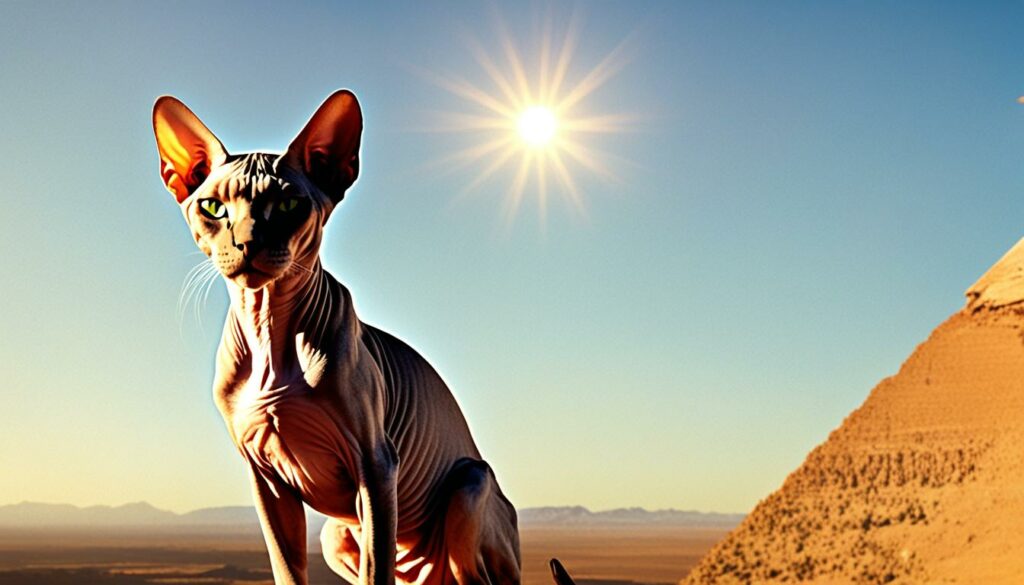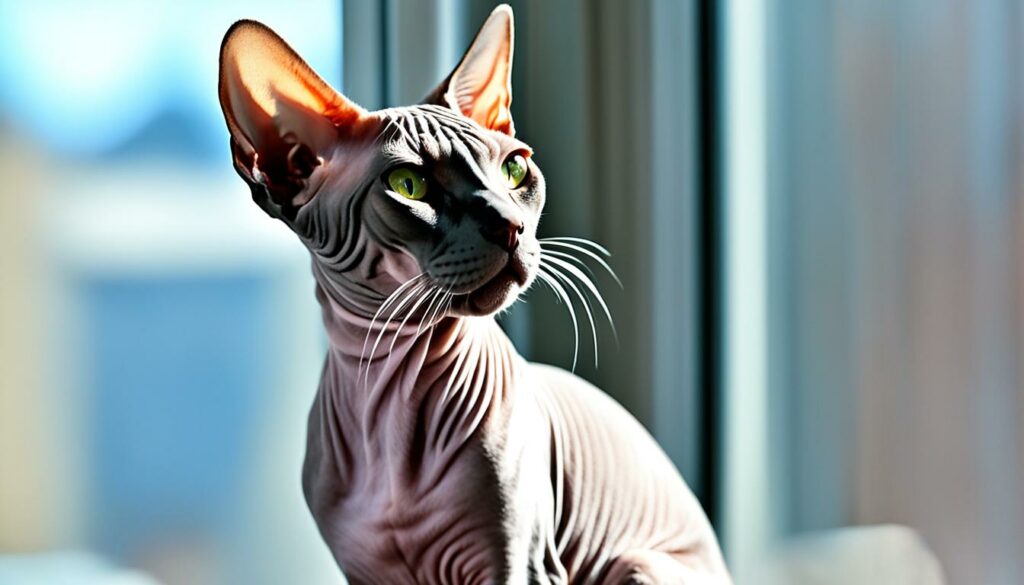
Welcome to our exploration of the intriguing origin and captivating history of the Sphynx cat breed. These hairless felines have captivated the hearts of cat lovers worldwide with their distinctive appearance and playful personalities. In this article, we will take a deep dive into the history of the Sphynx cat, tracing its origins and development over time.
Key Takeaways:
- The Sphynx cat breed has a unique and fascinating history.
- The breed can trace its roots back to ancient civilizations.
- Modern Sphynx cats owe their existence to dedicated breeders and enthusiasts.
- Sphynx cats possess distinct physical and behavioral traits.
- They have risen in popularity and have a dedicated community of enthusiasts.
The Ancient Origins of the Sphynx Cat
The sphynx cat, known for its unique hairless appearance, has a fascinating history that spans back thousands of years. To truly understand the origin of this distinctive breed, we must dive into its ancient roots and explore its genetic background.
The genetic background of the sphynx cat can be traced back to ancient civilizations, where accounts of hairless cats have been documented. One of the earliest records can be found in Egyptian history, with depictions of cat-like creatures resembling the modern-day sphynx.
While the exact genetic mutations that led to the hairlessness of the sphynx cat are still not fully understood, several theories have been proposed. One theory suggests that a natural genetic mutation occurred in a domestic cat population, resulting in the absence of fur.
These hairless cats were revered by ancient civilizations and were often associated with magical or divine qualities. They were kept as cherished companions, valued for their unique appearance and enchanting personalities.
Throughout history, the sphynx cat’s genetic background has been influenced by various cultures and breeding programs. In the mid-20th century, a geneticist named Dr. Hugo Hernandez began a selective breeding program in Mexico with a hairless kitten named Prune.
This breeding program, combined with the efforts of other dedicated breeders around the world, eventually led to the establishment of the modern sphynx cat breed as we know it today.
The Historical Connection
One notable historical connection to the sphynx cat is the association with the Egyptian sphinx, a mythical creature with the body of a lion and the head of a human or animal. The sphinx was considered a guardian and protector, often depicted with a prominent mane, symbolizing strength and wisdom.
The parallel between the hairless cat and the Egyptian sphinx may have further deepened the allure of the breed, captivating enthusiasts with its regal and enigmatic presence.
The ancient origins of the sphynx cat breed are a testament to its enduring appeal and captivating charm. From its genetic background intertwined with ancient civilizations to its modern-day recognition as a popular and beloved pet, the sphynx cat’s journey is one that continues to captivate and intrigue.
The Modern Sphynx Cat Breed
As the sphynx cat evolved over the years, the modern breed emerged from the dedicated efforts of key individuals and breeders who played a crucial role in its development. Let’s explore how this unique breed came to be.
One of the pioneers in establishing the modern sphynx cat breed was a domestic cat named Elizabeth, found in Toronto, Canada, during the 1960s. Elizabeth’s hairlessness was the result of a natural genetic mutation. Breeders recognized the potential of this unique trait and began working towards establishing a breed with consistent characteristics.
“We knew we had stumbled upon something special with Elizabeth. Her hairless appearance was captivating. We were determined to preserve this distinct trait and create a breed that would delight and intrigue cat enthusiasts worldwide.” – Breeder Quote
Through careful and selective breeding, breeders focused on enhancing desirable features such as the sphynx cat’s hypoallergenic qualities, affectionate nature, and striking appearance. They also aimed to maintain the breed’s overall health and robustness.
Key Individuals in the Development of the Modern Sphynx Cat Breed
Several individuals made significant contributions to the development of the modern sphynx cat breed:
- Dr. Hugo Hernandez: A researcher who played a vital role in studying the genetic mutation that led to hairlessness in the sphynx cat.
- Milt and Ethelyn Pearson: Breeders who worked alongside Dr. Hernandez to refine the breed and establish rigorous breed standards.
- Judee Frank: An influential breeder known for her commitment to promoting the sphynx cat breed and her dedication to its health and welfare.
| Aspect | Modern Sphynx Cat Breed | Traditional Cat Breeds |
|---|---|---|
| Appearance | The sphynx cat is known for its hairless or partially hairless body, with wrinkled skin, prominent cheekbones, and large ears. | Traditional cat breeds have varying coat lengths and textures, with a wide range of colors and patterns. |
| Temperament | Sphynx cats are generally friendly, outgoing, and affectionate, often described as social butterflies that enjoy human company. | Traditional cat breeds exhibit a wide range of temperaments, with some being more aloof or independent. |
| Care Requirements | Sphynx cats require regular bathing to keep their skin clean, as they lack the fur that naturally absorbs oils. Additionally, they may need protection from extreme temperatures due to their hairlessness. | Traditional cat breeds with various coat lengths require different grooming routines, ranging from occasional brushing to regular grooming sessions. |
Today, the modern sphynx cat breed has gained popularity worldwide and continues to captivate cat lovers with its unique charm and personality. Through the dedication and passion of breeders, this distinctive feline has secured a special place in the hearts of many.
Unique Characteristics of the Sphynx Cat
The sphynx cat possesses a set of unique characteristics that distinguish it from other cat breeds. Let’s explore these fascinating qualities that make the sphynx cat truly one-of-a-kind.
1. Hairlessness:
One of the most prominent features of the sphynx cat is its complete or partial lack of fur. This distinctive hairlessness is a result of a natural genetic mutation. Instead of traditional fur, the sphynx cat has a soft, warm layer of skin that gives it a velvety feel to the touch.
2. Muscular Build:
Beneath their hairless exterior, sphynx cats boast a well-defined and muscular body. Despite their delicate appearance, these feline companions are surprisingly strong and agile. Their sturdy physique is further emphasized by their broad chest, robust shoulders, and thick, powerful legs.
3. Affectionate Nature:
The sphynx cat is known for its affectionate and social nature. These cats thrive on human companionship and have a strong desire to be close to their owners. Sphynx cats often seek physical contact and love to cuddle, providing endless warmth and love to their human family members.
4. Playful Personality:
Not only are sphynx cats affectionate, but they also possess a playful and curious personality. These intelligent felines have a keen sense of adventure and enjoy interactive playtime. Their playful nature makes them great companions, always ready to entertain and engage in fun activities.
“Sphynx cats are like little mischievous explorers, always seeking out new adventures and games to play.” – Sphynx Cat Enthusiast
These unique characteristics combine to make the sphynx cat a captivating and beloved breed. Their hairless appearance, muscular build, affectionate nature, and playful personality make them an irresistible choice for cat lovers seeking a truly extraordinary companion.
The Sphynx Cat’s Rise to Popularity
Over the years, the sphynx cat has experienced a remarkable journey from a relatively unknown breed to its current status as a popular and sought-after pet. This unique feline has captured the hearts of cat lovers worldwide, with its distinct charm and captivating appearance.
Originating in the 1960s, the sphynx cat breed emerged as a result of selective breeding efforts by feline enthusiasts. These dedicated individuals were determined to create a hairless cat with a robust and affectionate personality. The result was a breed that defied conventional beauty standards and fascinated cat lovers with its distinctive features.
Initially met with skepticism, the sphynx cat gradually gained recognition and appreciation among cat enthusiasts. Its eye-catching, hairless appearance sparked curiosity and intrigue, leading to increased interest and demand. As more people discovered the unique qualities of the sphynx cat, its popularity soared, and a dedicated community of sphynx cat enthusiasts emerged.
The sphynx cat’s appeal goes beyond its distinctive appearance. These cats are known for their playful and affectionate nature, seeking constant interaction with their human companions. Their loving and social personalities make them highly sought-after as family pets.
In recent years, the sphynx cat has cultivated a strong presence in the media and popular culture. Celebrities and influencers often showcase their sphynx cats on social media platforms, further boosting the breed’s visibility and desirability.
As the sphynx cat’s popularity continues to grow, it is essential to understand its origin and rich breed history. By delving into the breed’s background, we can appreciate the careful breeding efforts and dedicated individuals who have contributed to its rise to prominence.
Next, we will explore the unique care requirements of sphynx cats, delving into bathing, skincare, and other considerations necessary to keep these delightful companions healthy and happy.
Caring for a Sphynx Cat: Tips and Considerations
When it comes to caring for a sphynx cat, there are a few unique considerations to keep in mind. Their lack of fur means they have some specific needs to ensure their health and well-being. Here are some sphynx cat care tips:
Bathing and Skincare
Due to their hairless nature, sphynx cats produce more oil, which needs to be gently and regularly removed through bathing. It’s important to use a mild, hypoallergenic shampoo specifically formulated for cats. Be sure to rinse them thoroughly, as any residue can irritate their sensitive skin. Additionally, regular skincare is crucial to protect their exposed skin from potential sunburn and dryness. Consult with your veterinarian to determine the best moisturizers or sunscreens to use.
Environmental Considerations
Sphynx cats are sensitive to temperature changes and are prone to feeling cold. It’s essential to provide them with a warm and comfortable environment. Consider providing soft blankets or beds for them to snuggle in, especially during colder seasons or in air-conditioned spaces. You may also want to provide heat sources like heating pads or heated beds to keep them cozy.
Protecting Sensitive Skin
Since sphynx cats lack fur, their skin is more exposed and vulnerable. It’s important to protect them from potential injuries or irritations. Keep an eye out for any scratches, bruises, or rashes that may occur during playtime. Ensure their environment is free from sharp objects or any potential hazards that could harm their delicate skin.
Regular Vet Check-ups
Just like any other cat, sphynx cats require regular veterinary check-ups to monitor their health and address any concerns. Regular vaccinations, parasite prevention, and dental care are crucial to their overall well-being. Remember to schedule routine visits with your veterinarian and don’t hesitate to reach out if you notice any changes in their behavior or appearance.
Proper Diet and Hydration
Feeding your sphynx cat a balanced diet is essential for their overall health. Consult with your veterinarian to determine the appropriate type and quantity of food based on their age, weight, and specific needs. Ensure they have access to fresh water at all times to stay hydrated, as sphynx cats may be more prone to dehydration due to their lack of fur.
Emotional Well-being
Sphynx cats are known for their affectionate nature and crave human companionship. Regular interaction, playtime, and providing them with stimulating toys can help prevent boredom and ensure their emotional well-being. Consider adopting another cat or pet to keep them company if you’re away from home for extended periods.
Remember, each sphynx cat is unique, so it’s important to pay attention to their individual needs and preferences. By following these sphynx cat care tips, you can provide them with the love, care, and attention they need for a happy and healthy life.
Understanding the Sphynx Cat’s Personality
The sphynx cat is not only known for its unique appearance but also for its captivating personality traits. These furry companions possess a distinct combination of characteristics that set them apart from other cat breeds, making them a beloved choice for many pet owners.
Curiosity and Playfulness
Sphynx cats are naturally curious creatures, always seeking new adventures and exploration. Their inquisitive nature drives them to investigate every nook and cranny of their surroundings, making them excellent explorers. This personality trait adds an element of excitement and unpredictability to their interactions, keeping their owners entertained.
In addition to their curiosity, sphynx cats are highly playful. They love engaging in interactive play sessions, whether it’s chasing toys, playing hide-and-seek, or pouncing on feather wands. Their playful nature ensures hours of amusement for both the cat and their human companions.
Affectionate and Social
Sphynx cats are renowned for their affectionate and social nature. They thrive on human companionship and are often referred to as “velcro cats” for their tendency to stick close to their owners. These cats enjoy being involved in every aspect of their owner’s lives, whether it’s cuddling on the couch, following them around the house, or curling up beside them at night.
Their affectionate nature extends beyond their human companions. Sphynx cats are known to get along well with other pets, making them a great addition to multi-pet households. Their social skills and friendly demeanor make them adaptable and adaptable to various environments and social interactions.

Intelligence and Trainability
Underneath their hairless exterior, sphynx cats possess remarkable intelligence. They are quick learners and can easily pick up new tricks and commands. This trainability makes them an excellent candidate for clicker training and interactive puzzle toys that stimulate their mental abilities.
Sphynx cats have a knack for problem-solving and are often described as having a mischievous and clever personality.
Their intelligence combined with their social nature makes them highly adaptable to training and allows for a deeper bond between the cat and their owner.
Emotional Sensitivity
Sphynx cats are known for being emotionally sensitive and responsive to their owner’s moods. They have a unique ability to sense when their human companion needs comfort and will instinctively provide affection and support. This emotional sensitivity creates a deep bond between the sphynx cat and their owner, making them incredibly empathetic and understanding pets.
It’s important to note that every sphynx cat possesses its own individual personality, and while these traits are commonly found in the breed, variations can occur. Proper socialization, training, and providing a nurturing environment are essential in shaping a sphynx cat’s personality and ensuring their overall well-being.
Conclusion
In conclusion, the sphynx cat is truly a fascinating breed with a rich history and unique characteristics. We have explored its ancient origins, tracing its genetic background back to ancient civilizations. From there, we have witnessed the breed’s evolution into the modern sphynx cat we know and love today, thanks to the dedication of passionate individuals and breeders.
The sphynx cat’s hairlessness, muscular build, and affectionate nature make it stand out among other cat breeds, captivating the hearts of many. Its rise to popularity is a testament to its charm and the strong bond it forms with its human companions.
When it comes to caring for a sphynx cat, special attention must be given to its sensitive skin. Regular bathing and skincare routines are essential for maintaining its health and well-being. Understanding its playful and curious personality traits will further enhance the bond between you and your sphynx cat, as you embark on a joyful journey together.
